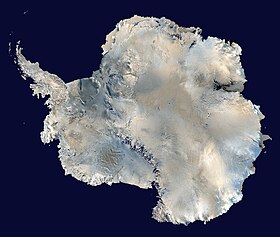Antarctica

Antarctica (from Greek ἀνταρκτικός, opposed to the arctic) is a continent surrounding the Earth's South Pole. It is the coldest place on earth and is almost entirely covered by ice. It is not to be confused with the Arctic, which is located near the Earth's North Pole.
Antarctica was discovered in late January 1820. For more details see the article on the History of Antarctica.
Antarctica is the fifth largest continent in area, after Asia, Africa, North America, and South America. However, it is the smallest in population. It is also the continent with the highest average altitude, and the lowest average humidity of any continent on Earth, as well as the lowest average temperature.
It has been assigned the Internet ccTLD .aq.
Geography
Main article: Geography of Antarctica
Territorial claims

Several nations, particularly those close to the continent, made territorial claims in the 20th century. These claims have little practical relevance but continue to be observed by cartographers.
Most countries that have observation or study facilities in Antarctica have those facilities within their claimed territory. The Antarctic Treaty defers these claims and most other nations do not recognize them. No other nations have made claims themselves, although the United States and Russia assert the right to do so.
- Argentina: 25°W to 74°W; overlaps Chilean and British claims; claimed 1943 as part of the Tierra del Fuego - Antarctica & South Atlantic Isles province
- Australia: 160°E to 142°E and 136°E to 45°E; claimed 1933 as the Australian Antarctic Territory
- Brazil: 28°W to 53°W; overlaps Argentine, British and Chilean claims; Zone of Interest designated 1986
- Chile: 53°W to 90°W; Overlaps Argentine and British Claims; claimed 1940, see Chilean Antarctic Territory
- France: 142°E to 136°E; claimed 1924 as part of the French Southern Territories. It is called Terre Adélie
- New Zealand: 150°W to 160°E; claimed 1923, see Ross Dependency
- Norway: 45°E to 20°E; claimed 1938 as Dronning Maud Land, and including Peter I Island
- United Kingdom: 20°W to 80°W; overlaps Argentine and Chilean claims; claimed 1908, see British Antarctic Territory and the lists of its Administrators, Commissioners, and High Commissioners
No formal claims have been made in the sector between 90 degrees west and 150 degrees west.
Former claims
- Germany: 20°E to 10°W; overlapped Norwegian claim; claimed 1939–1945 as New Schwabenland
- South Africa: claimed 1963–1994

Population
It is usually estimated that at a given time there are at least 1000 people living in Antarctica. This varies strongly with season.
Antarctica has no permanent residents, but a number of governments maintain permanent research stations on the continent. Many of the stations are staffed around the year. These include:
- Amundsen-Scott South Pole Station, South Pole (U.S. Antarctic Program)
- Bernardo O'Higgins Station, Antarctic Peninsula, Chilean Army.
- Casey, Vincennes Bay (Australian Antarctic Division)
- Comandante Ferraz Station, King George Island (62¨08°S, 58¨40°W) Brazil
- Davis, Princess Elizabeth Land (Australian Antarctic Division)
- Dumont d'Urville Station (66°40'S, 140°00'E) France
- Eduardo Frei Montalva Station and Villa Las Estrellas, King George Island, Chilean Air Force.
- Georg von Neumayer Station, (70°39'S, 08°15'W) (Atka-Bay) (Alfred Wegener Institute, Germany)
- Halley Research Station (75°35' S, 26°34' W) British Antarctic Survey
- Maitri Station, (70°45.58' S, 11°43.56' E) near Schirmacher Region (Indian Antarctic Program)
- Marambio Station, Seymour-Marambio Island (Argentina) website
- McMurdo Station, Ross Island (U.S.)
- Macquarie Island (Australian Antarctic Division)
- Mawson, Mac Robertson Land (Australian Antarctic Division)
- Mirny Station ((Russia)
- Mizuho Station (70°41'S, 44°19'E) (National Institute of Polar Research, Japan)
- Palmer Station, Anvers Island (U.S.)
- Rothera Research Station (67°34' S, 68°08' W) British Antarctic Survey
- SANAE (South African National Antarctic Expeditions), on the Fimbul Coastal Ice Shelf in Queen Maud Land
- Scott Base, Ross Island (New Zealand)
- Showa Station (66°00'S, 39°35'E) (National Institute of Polar Research, Japan)
- Vostok, Antarctica (78 28'S and 106 48'E) (Russia)
Literature set in Antarctica
- Beryl Bainbridge's The Birthday Boys (1991) (a fictionalised account of the expedition of Robert Falcon Scott)
- H.P. Lovecraft's At the Mountains of Madness (1936)
- Edgar Allan Poe's The Narrative of Arthur Gordon Pym of Nantucket (1838) (though Poe's imagined Antarctica has little in common with the real one)
- Matthew Reilly's Ice Station (1997)
- Kim Stanley Robinson's Antarctica (1997)
- Elizabeth Arthur's "Antarctic Navigation" (1995)
- John Calvin Batchelor's "The Birth of the People's Republic of Antarctica" (1983)
- John W. Campbell Jr.'s Who Goes There? (1938) (the basis for The Thing From Another World (1951) and The Thing (1982))
See also
- Ecology of Antarctica
- Climate of Antarctica
- Communications in Antarctica
- Demographics of Antarctica
- Economy of Antarctica
- History of Antarctica
- Government of Antarctica
- Military of Antarctica
- Transportation in Antarctica
- Sub-antarctic islands
- Life in the Freezer, a BBC television series on life on and around Antarctica
- Diamond dust, an Antarctic optical phenomena
- Air New Zealand Flight 901
External links
- Iceberg gallery
- Portals on the World - Antarctica from the Library of Congress
- British Antarctic Survey
- ANetStation
- The World Factbook – Antarctica from the U.S. Central Intelligence Agency
- The Antarctic Digital Database - a source of digital topographic map data for Antarctica
- The Scientific Committee for Antarctic Research - coordinating body for Antarctic Science
